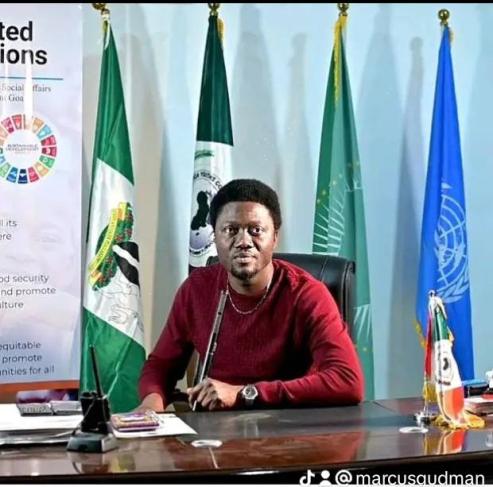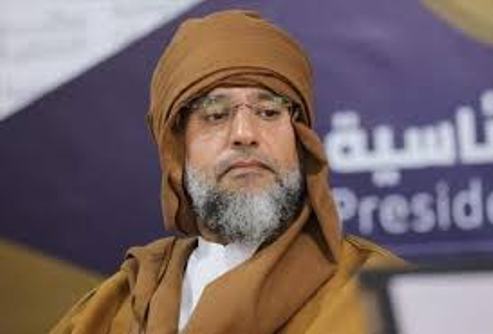LAGOS JUNE 3RD (NEWSRANGERS)-Ekure hailed from a small slum community known as Eku which is situated in the suburb of Ethiope East local government area of Delta state in the Niger Delta region of Nigeria. Though his community and region have great potential for wealth and represents the economic vertebra of the Nigerian economy due to the enormous wealth of crude oil and other mineral resources, but multidimensional poverty seem largely evident with evidence of institutional neglect in poor infrastructural development characterising the contextual reality, implying a paradox of poverty in the midst of plenty.
I felt compelled to share the story of my context as summarised above, because it probably constitutes the better part of what has greatly shaped my overall professional and academic life today.
However, growing up in the slums, refined by poverty and looking at the unpleasant reality in his context such as the growing rate of unemployment, multi-dimensional poverty youth restiveness and criminality, addiction and a whole range of other social vices that proliferates communities in the region largely due to displacement by oil exploration and weak institutional intervention was largely responsible for the igniting of the burning desire in him to change the narrative by proffering possible solutions to social concerns.
While speaking to NewsRangers an online newspaper, Ekure disclosed that the aforementioned characteristic was very evident in my undergraduate days which saw him going to speak to large audience of students while waiting to take their general studies classes on a range of topics such as the relevance of self and community development, dangers of cultism and addiction, power of focus, respect for constituted authority etc.
“The University soon recognised my effort and allocated a venue to me where I meet with new undergraduate students and offer pastoral care and mentorship to them while undertaking their studies, an effort which saw many of them graduate with good character and grades,” he recalled, adding that after his first degree, he committed himself fully to social works which saw him volunteering on different occasions to pursue various social objectives.
According to him, in 2011, he successfully incorporated first organisation community based non-governmental organisation, Urhobo Progressive Youth Association, UPYA with Nigeria CorpOrate Affairs Commission (CAC) which sought to tackle the problem of unemployment through capacity building for local youth and women in the region.
“At first, looking at the high rate of graduates of Niger Delta origin being churned out of the University annually, I saw a need to create a database system which would facilitate employers – jobseekers’ engagement. To achieve this, I sourced for local funding at individual level by presenting my plan to notable individuals and politicians who supported the actualisation.
“After the launching of the database system which became very populated within a short period of time, it became incumbent on me to reach out to local employers with a view to creating the awareness of the database and how it could benefit them. In this regard, I did lots of publicity and major journeys to big cities (which I referred to as missionary journeys) meeting with captains of industries and recruitment organisations. The result of this social intervention has generated over 1000 employment in the region,”Ekure who holds a Bachelors degree in Accounting, Masters in Marketing and is studying for his Ph.D in Marketing Communication confirmed.
Marcus Ekure who is relentless in his ambition to empower the jobless youths, set up a leadership and vocational institute where youths and women from communities far and near in Niger Delta region acquired leadership, vocational and entrepreneurial skills for free. The Institute which was commissioned in 2013 has seen over 8,000 youths and women graduated with relevant skills across communities within Delta state where it is situated and has contributed meaningfully to rural economic rearmament as many of these communities can now boast of producing some of their consumables locally and redistributing wealth internally.
“Basically, on the vocational offering the centre had ICT department (which was a core area of interest to some local employers), catering and confectionary, production department (where students are being taught basic production such as Soap, Shampoo, Aftershave solution, Paint, Perfume etc), Barbing/Haircut, hair dressing, Mobile Phone repairs, Solar Panel installation etc as well as compulsory entrepreneurship module which teaches them basic entrepreneurial principles and bookkeeping,” Ekure who is an international public speaker, social entrepreneur and vocational consultant with over 18 years field work experience in social re-engineering, youth empowerment, human capital and community development disclosed.
Consequently, by the year 2016, the UPYA Leadership and Vocational centre as well as the database innovation had become very popular for youth and women engagements such that space and distance became a very big challenge, especially to intending participants in distant rural communities within the Niger Delta.
He pointed out that this gap led to the creation of a new enterprise known as the Mobile Empowerment Train (MeT), which has now evolved into Rural Entrepreneurship Development Strategy (MeTrEds), a mobile vocational and entrepreneurial capacity building vehicle that fosters entrepreneurship development in deprived rural communities.
He recalled that when he conceived the idea, funding in terms of acquiring a van and relevant equipment to actualise this objective became a challenge being a social entrepreneurial venture.
“To resolve the challenge, I had to publish the plan via my social media handles and I got international support from a philanthropist who donated a Toyota Van and 25 Laptop computers for the ICT Department. The Donor, specifically said he has been observing and following my community impact programs and intervention initiatives for about two years and that, when he saw the request for support to actualise the mobile empowerment train vision, he felt it was the best opportunity for him to identify with me. And he has been a major supporter and funder of my programs till date, through his Foundation”, he explained.
Based on his outstanding success and trajectory of human capital and community development, in 2019, he was invited by the Federal University of Petroleum Resources, FUPRE in Delta State after several failed efforts by management to establish a vocational and entrepreneurship centre in the University, to submit a proposal for establishing a vocational and entrepreneurship centre for the University which he did, and the proposal became successful.
Due to his passion for community development and overtime experiential knowledge in community projects implementation, he was able to complete the project in less than record time, hence he was offered an automatic appointment by the then Vice Chancellor, Professor Akii Ibhadode to serve as the coordinator of the centre which offered him the opportunity to also teach entrepreneurship and strategy under the General Studies Unit of the institution.
Due to his achievements in FUPRE, he received an invitation to participate in the UN Global Festival of Action at the UN Campus in Bonn, Germany where he made a presentation (me during the Bonn event) on the Mobile Empowerment Train as a potential tool for actualising key objective of the Sustainable Development Goals.
Responding to questions on his operational strategy, Ekure said heplan to utilise a place-based community intervention which would involve identifying social challenges, specifically addiction and knife crimes, which exist in communities and generating local solutions in addressing them based on his professional knowledge and experience.
According him, this strategy shall involve the use of a camp van, fully branded in the logo of partners and sponsors through which he and his team of volunteers shall reach out to communities (mainly rural) addressing problems of addiction and other social vices such as knife crimes as mentioned above.
Hear him, “first, to tackle the issue of addiction, I shall work with relevant authorities and agencies to identify and collate statistics of recovery hubs in Scotland and engage my expertise and professional experience as a social entrepreneurial expert to scale their operational efficiency. I shall do this in three ways, by reviewing their operational procedures, identifying possible gaps, and recommending new and smart strategies to scale their operational efficiency and productivity.
“Secondly, I will work with them to organise efficient post recovery management strategy using entrepreneurial strategy. My experience working with some recovery hubs in the UK as highlighted above, has shown that many of them are not so efficient due to operational deficiency arising from lack of strategies. As a result, many of the victims either do not complete the recovery process or fall back to the addiction problem.
“This observation is supported by a research outcome in 2015, which indicated that every 4 out of 10 victims of addiction- are unable to complete their recovery program. Secondly, I shall assist them in setting up a local entrepreneurial incubatory system that would equip them with vocational and entrepreneurial capacity building as well as stimulate in them strong sense of community development consciousness. This would improve their self-confidence and social interactivity. I also intend to develop a local database system that would bring local business owners (employers) in contact with members of these recovery hubs as I am already doing with one of the recovery hubs named above.
“In this way, my proposed intervention would foster better community bonding and social interaction which research has shown to be very potent in interventions aimed at helping victims of addiction. This intervention will instil in them a sense of agency and community development thinking that could enable them to develop self-confidence, aspiration, and interest in community building. Often these people do not believe in themselves, and do not think they can contribute meaningfully to societal development. Therefore, my proposed entrepreneurial incubatory solution, via simple incremental steps such as self-driven litter picking/gardening/dog walking services, etc within own communities could help victims of addiction to rebuild self-esteem and civic pride and engagement.
Third, I shall organize a platform that would regularly bring various social service providers together to enable them to connect and positively collaborate for improved efficiency. This could be a great way of identifying individual organization’s strength and identifying opportunity for strategic alliances.
“On the other hand, to address the issue of knife crime, I intend to work with various schools (the primary and secondary), existing charity organisations and enterprise institutions, partner with them and through their platforms, reach out to the youth with entrepreneurial value delivery aimed at productively engaging and stimulating entrepreneurial mindset in them. Experience has shown that for any social intervention such as knife crime and the likes, to be efficient and sustainable, solution proposition must be redirected at the foundation such as the schools and parents which represent the primary agents of socialization.
Most children spend the most part of their lives playing computer and video games and not interacting or engaging in social value creation. When communities are segregated without productive interactivity or engagements, and children are not properly engaged, there is higher chances of children developing difficult behaviours. So, part of my strategy would be to collaborate with key stakeholders, and deploy my professional experience and skills in building entrepreneurial activities for both children and youth to stare entrepreneurial thinking in their minds. The idle mind they say is the devil’s workshop. To keep these young stars out of troubles, it is important to understand their psychology and keep them constructively engaged. As contained in my profile, I have successfully carried out various highly engaging interventions involving mentorship for primary and secondary pupils using my catch them young platform (primary school and secondary school outreaches).
“In this regard, I shall collaborate with primary and secondary schools authorities, in line with existing regulatory framework, to organize entrepreneurial programs that would instil in them consciousness of entrepreneurship. We could for instance, have days where students would be encouraged to invent and showcase their products in an auction set up, where members of my team would come in the Mobile Empowerment Train to physically inspect and patronize these products while commending the young stars.
“Finally, if my proposal is accepted, as already highlighted above, I will commit to using my skills to promote wellbeing, self-esteem and constructive behaviour in youth- by promoting entrepreneurship and developing an enhanced sense of agency within young people in deprived communities. Demonstrating the existence of positive alternative opportunities despite challenging circumstances in place of sliding into gang culture and anti- social behaviour such as knife crime. “
For advert media placement, events coverage, media consultancy, placement of publications and further inquiries please WhatsApp 2348023773039 or email: labakevwe@yahoo.com











